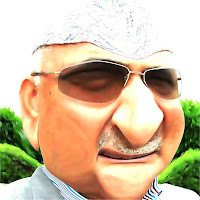Seeking to paper over its chronic internal woes, the CPN-UML wants to bring Khadga Prasad Sharma Oli, together with Bam Dev Gautam and Amrit Kumar Bohara, into the constituent assembly.
The precedent certainly exists. The party brought in Madhav Kumar Nepal, someone who lost in both constituencies from which he had contested the 2008 elections, who rose to the premiership. Admittedly, that move was engineered more by the Maoists, whose chief Pushpa Kamal Dahal would subsequently come to rue. Yet, Maila Baje feels, we must not forget that Madhav Nepal’s ‘undemocratic’ entry came at a time when the assembly had a clear degree of legitimacy and embodied much hope and expectation.
Oli, like Gautam, was defeated in the election. Bohara, nominated by CPN-UML under the proportional representation system, refused to take a seat, citing his party’s poor performance in the polls. Today, all of the members are staying on beyond the two years the people had hired them for. It should be less of a blow to democracy should Oli and Co. eventually enter the assembly.
Yet a section of the party is opting for a go-slow approach. These members are more keen on giving Oli greater respectability in the party before sending him to the assembly. Members want Oli – who currently ranks 10th in the party hierarchy – to get the third position after Khanal and Madhav Kumar Nepal, with the title ‘senior leader’.
It might be useful to consider Nepal’s own contribution in the aftermath of Dahal’s resignation in 2009. What could have been a truly catastrophic succession struggle came to an easy denoument because of Madhav Nepal’s easy availability.
Now that the one the nation was waiting for – Dr. Baburam Bhattarai – has proved no different from his predecessors, Oli might be emboldened to seek the office that Madhav Nepal so assiduously denied him (and Gautam, for that matter) during the first phase of royal rule in 2002-2004.
Make no mistake. Jhal Nath Khanal is not acting out of any sense of altruism. And it’s not as if Oli allowed Khanal an easy time as premier. The UML chief needs to restore control in the party and rejuvenate the base. He sees an opening in the reality the CPN-UML has become more disciplined than either the Maoists or the Nepali Congress. Moreover, the UML chairman must have learned something from the dividends Dahal has reaped from his ‘magnanimity’ in allowing Dr. Bhattarai to take the top job.
Oli, too, has the benefit of wisdom. Instead of flaunting his external support – which we understand is considerable – he can hope to rely on either the Sher Bahadur Deuba or Ram Chandra Poudel faction, depending on the case. By pushing Dr. Bhattarai back into the swamp of the party, he could hope to benefit from the process of another realignment within the Maoists. The fact that the former rebels would be able to evade the full spotlight on their responsibility for the sordid state of affairs should give Oli some breathing space.
The smaller parties inside the assembly and those outside could still rail against the monopoly of the ‘big-party syndicate’. Our venerable civil society notables could continue pretending they have nothing to do to with the mess. (They were the ones, weren’t they, who believed they could lead the leaders before and after the April 2006 Uprising?)
The peace process will remain in good shape as long as we can kick the can down the road.
